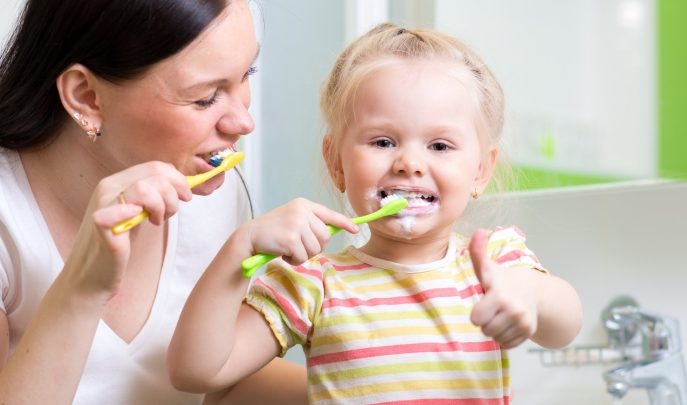Time To Brush Up – What Nurseries Can Do To Help Prevent Tooth Decay

Dentist Chig Amin explains why early years settings have a vital role to play in ensuring that children's teeth don't cause problems later on…

- by Dr Chig Amin

Early childhood tooth decay is the number one reason why children aged five to nine are admitted to hospital in England – despite the fact that the disease is completely preventable.
Almost a third of five-year-olds in England have tooth decay [PDF], with the average child affected by decay suffering with at least three rotten teeth. Children’s primary teeth – more commonly referred to as ‘baby teeth’ – are particularly susceptible to decay, due to their thinner and less resilient composition, which makes them more vulnerable to acid produced by oral bacteria.
Young children are particularly at risk from an aggressive form of decay called early childhood caries (ECC). Also known as ‘nursing caries’ or ‘baby bottle decay’, it’s associated with frequent consumption of sugary drinks from baby bottles or sippy cups.
The good news, however, is that nurseries and children’s centres can help to reduce early childhood tooth decay by educating children and their parents in how to care for their teeth by introducing supervised toothbrushing programmes.
Key Players
Levels of tooth decay prevalence vary dramatically among three to five-year-olds, making early years settings – and especially those in deprived areas – key players in helping to tackle tooth decay. Children living in the North West of England, for example, are 64% more likely to suffer from an oral health issue than those living in the South East.
There are various reasons for these regional inequalities, but socio-economic factors such access to NHS dental care and local availability of water fluoridation [PDF] are the key ones. If your nursery is located in an economically or socially troubled area, it’s more likely that the children accessing your services are at a higher risk of oral health problems.
The National Institute for Health and Care Excellence suggests that nurseries in such areas should introduce supervised toothbrushing schemes to help tackle early childhood tooth decay.
Supervised toothbrushing schemes [PDF] and fluoride varnishing programmes [PDF] already form part of the daily routine at all nurseries and children’s centres across Scotland and Wales, having originally been introduced under national government initiatives in 2001 and 2009 respectively. Both schemes have resulted in vast improvements to children’s oral health across different social groups; in the decade since Scotland’s scheme began, the cost of treating childhood dental disease has halved.
England is currently lagging behind in terms of government-led initiatives, but there are a number of campaigns that are working with nursery and primary schools to help improve children’s dental health, such as Stop the Rot and the British Dental Health Foundation’s recently launched Brush Time programme.
Be Aware of Sugar
Sugar plays a key role in early childhood tooth decay, as it fuels the formation of acid by oral bacteria. The recommended guideline daily amount (GDA) of sugar for children aged four to six is roughly 19g – but in reality, the average child is consuming three times that much [PDF] on a daily basis.
Ensuring that your nursery provides a healthy menu that’s low in sugar, and offers only water or milk to children is crucial. Fruit juice, although considered to be healthy, has a high sugar and acid content that can contribute to enamel wear and lead to tooth decay in young children if consumed regularly.
Toothbrushing Tips
Whether your nursery is in a high risk area or not, the children will still benefit from the introduction of a toothbrushing programme and regular activities that highlight the importance of good oral health.
Set up a toothbrushing programme Introducing a toothbrushing programme [PDF] into your nursery’s everyday activities will help to ensure that toothbrushing is seen as a positive activity which becomes a routine.
Lead by example Children and adults alike should brush their teeth at least twice a day with a fluoride toothpaste, so make sure you’re leading by example! Children love to copy – if they see you enjoying caring for your own teeth, they’ll want to do the same.
Supervise and assist where necessary Children under 3 should have their teeth brushed for them, and all children up to the age of 7 should be supervised when brushing their teeth. It’s important that children learn how to brush their teeth properly, to ensure effective brushing and the formation of good habits.
Make it fun Some children really don’t enjoy having their teeth cleaned, so making it as fun as possible is important to getting the job done! Motivators like reward charts and stickers can help things along, as well as fun songs and rhymes.
Make oral health a ‘hot topic’ with parents Emphasising the importance of good oral health routines and encouraging parents to continue the toothbrushing activities at home will ensure consistency for the children. Make a point of praising the children for their toothbrushing progress in front of parents, and try to incorporate oral health into home-time handovers.
Dr Chig Amin is the owner and principal dentist of the Epsom Dental Centre. For more information, visit epsomdental.co.uk or follow the Epsom Dental Facebook page











